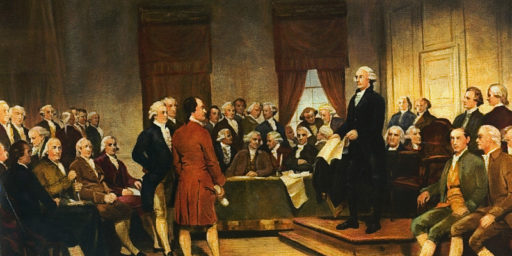Exit Poll Panic
Hugh Hewitt cautions people about getting too excited about exit polling data. He points us to Mark Blumenthal, who writes,
So sometime very soon, the traffic on certain web sites will hit astronomically high levels as the blogosphere goes in search of the latest leaked exit polls. The conventional wisdom on this is unshakable: The networks “know” who will win, but won’t tell us. Lets take our own peek at results shared by those working at the networks today and get in on the secret.
Well, I hate to disappoint, but this site will not be a source of leaked “exits.” However, I would like to take a moment and give you a bit of a reality check. Let me tell you a bit about what exit polls are and why you may want to take what you hear over the web with a giant grain of salt.
I have always been a fan of exit polls. Despite the occasional controversies, exit polls remain among the most sophisticated and reliable political surveys available. They will offer an unparalleled look at today’s voters in a way that would be impossible without quality survey data. Having said that, they are still just random sample surveys, possessing the usual limitations plus some that are unique to exit polling (I also remain dubious about weighting telephone surveys to match them, but that is another story for another day).
He then provides a very convincing explanation of why early numbers are not predictive. Both posts are worth a read. See also an oldie but goodie from Dan Drezner entitled “EARLY EXIT POLLS MEAN SQUAT.”
The early exit polls I’ve seen so far are actually rather bizarre–Kerry running away with Pennsylvania and other states where I expected him to win closely but with the Republican Senate candidates having a much easier time than any of the polls gave us any reason to expect. Those results could hold up–this has been one whacky election cycle and old rules have often been totally worthless as predictors–but I’d wait around a bit before betting the farm.
I agree with Mark about the overall value of exit polls, though. They’re a wonderful tool–the best we have, so far as I know–for analyzing the “internals” of an election once it’s over. They’re much more reliable indicators of why people voted in a certain way than they are at projecting a final outcome. Indeed, that’s true of social science generally: we’re much better at explaining than predicting.
Update (1606): Slate’s Jack Shafer offers this advice:
Exit Poll Charade: Why Slate is posting the exit-poll numbers: As this item posts, the first raw exit-poll data are streaming from the National Election Pool consortium owned by the Associated Press and the five television networks (CBS, ABC, NBC, Fox, and CNN) to their news divisions and to the newsrooms of NEP subscribers—big city newspapers and other broadcasters.
These early exit-poll numbers do not divine the name of the winner. Instead, regard these numbers as a sportswriter does the line scores from the fourth inning of a baseball game. The leading team might win the game, but then again it might not. But having the early data in front of him helps the sportswriter plot the story he thinks he’ll need to write at game’s end. As you read this posting, the political reporters at the networks, the New York Times, the Washington Post, the Los Angeles Times, NPR, Newsweek, and about two dozen other news outlets are cracking their knuckles over their keyboards, contemplating the story, while statisticians and political analysts at the networks prepare to run the numbers through their computer models to generate a prediction.
The paid users of exit-poll data have signed a blood oath not to divulge it to unauthorized eyes, and the networks have promised not to call any states before their polls close. But the numbers always leak out to other journalists—such as the writers at Slate—and starting at about 5 p.m. ET or so, the news anchors start giving clues about what they’ve learned from the exit-poll results. As John Tierney writes in today’s New York Times, the result on television is sometimes like a “version of the Dance of the Seven Veils, in which anchors or correspondents will pretend not to know what’s happening in a state but give enough clues for the discerning viewer. They might allude to the high spirits at one campaign headquarters, or start speculating about what effect the loss of this state would have on the other candidate.”
*** Slate believes its readers should know as much about the unfolding election as the anchors and other journalists, so given the proviso that the early numbers are no more conclusive than the midpoint score of a baseball game, we’re publishing the exit-poll numbers as we receive them. Some people say it’s irresponsible to publish the numbers—or broadcast early projections of winners—because it may disturb voter turnout. As Slate Editor Jacob Weisberg put it in today’s Times, he doesn’t want to put the Web site “in the paternalistic position of deciding that our readers aren’t mature enough to react in the proper way to truthful information we possess.”
Fair enough.






Why would anyone get interested in these lame polls? Why not wait until the ENTIRE data set is recored, i.e., the poll has closed and the results tabulated. THAT is the real enchilada. That is when the celebrations begin!
James, for a conservative you are usually pretty level headed. When I think you are wandering off into fantasy land I try to call you on it. But this is a good report on early exit polls. I think it looks pretty good for Kerry, but then I have always thought he would win.
Regardless of the outcome thank you for this site. Unlike some of your conservative collegues you allow dissenting opinions to be posted and your responses have always been decent. I hope you keep it up even after the election.
“for a conservative”
“wandering off into fantasy land”
“Unlike some of your conservative collegues”
Gee, Ken, how many left hands do you have?
todd, perhaps you haven’t seen James’ occasional forays into almost wingnuttery? He never really crosses the line but he does flirt with the fantasy once in a while.
He looks to me like a solid conservative with some occasional good insight. That is why I as a liberal enjoy visiting here. With his indulgence, I also get to post comments. This is rare for conservatives of his caliber. Notice neither Sullivan, Bainbridge nor Reynolds allow commentary.
perhaps you haven’t seen James’ occasional forays into almost wingnuttery?
Um, no. Seen plenty of yours, though, Ken.